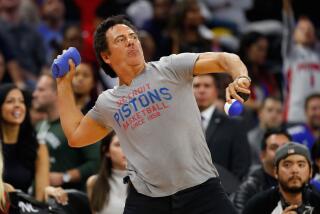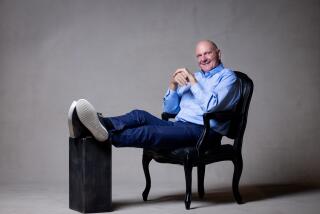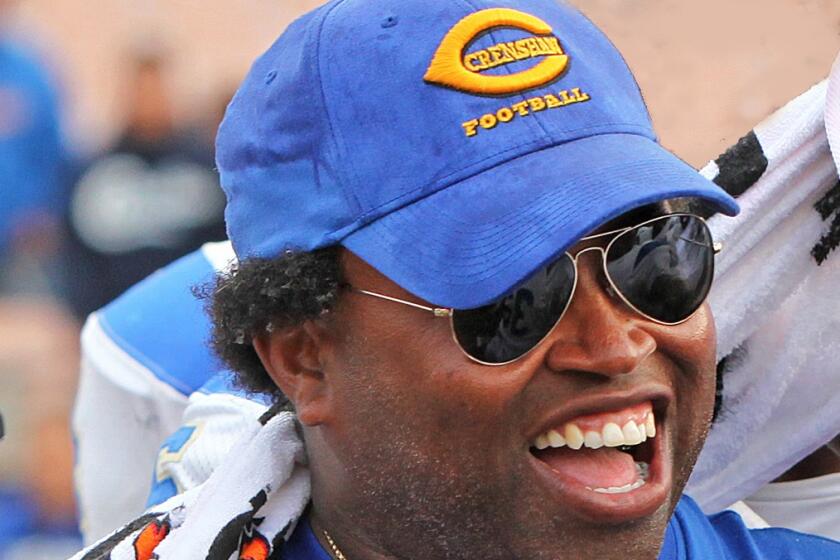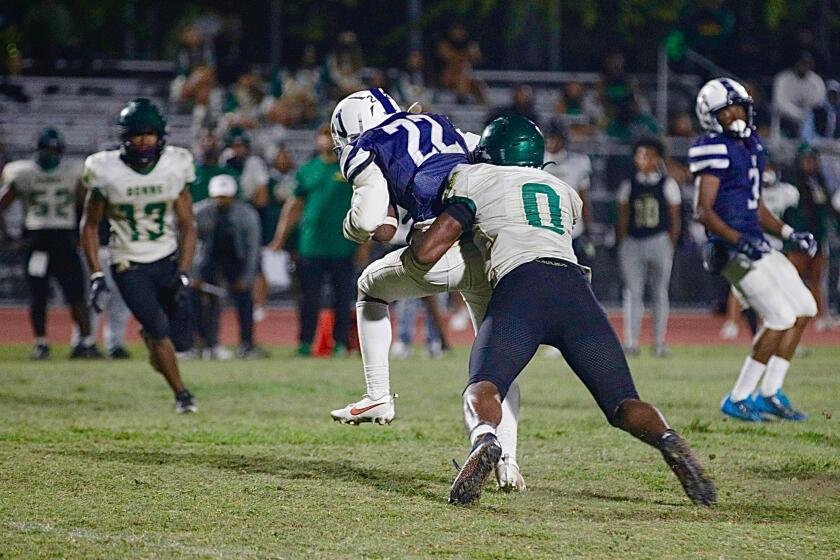Will He Become Profit Isiah? : Thomas Maneuvered Himself Into a Position to Purchase the Raptors, Now He Focuses on an Entertainment Empire
It is an American tale about a ghetto kid turned corporate roller, but it was made possible by the boardroom brawls of Canada and a fight among white guys who all wanted to get their way.
Had the Slaights not mistrusted the Bitoves, had the Bitoves not been at odds with the Stavros, had this townâs devotion to hockey not been so hidebound that it sneered at the notion of a basketball-only arena, former Detroit Pistons superstar Isiah Thomas would today still be an employee, general manager of a quick-starting young TorontoRaptors franchise, but no more than that.
Yet in the fallout of a feud that runs deep among Torontoâs corporate elite, Thomas saw his chance to become The Man. The Boss. A chance to show the world that he is about more than crossover dribbles and scouting new talent.
With the same dexterity he displayed on the court leading the Detroit Pistons to two world championships, Thomas maneuvered himself into position to buy the 2-year-old Raptors franchise and begin building what he hopes will be a sports and entertainment empire. A half century after Jackie Robinson broke baseballâs color barrier on the field, Thomas is breaking a color barrier of his own.
His estimated $150 million deal with current Raptors owner Allan Slaight would make him the first African American to own a major league sports franchise in North America, a feat he hopes will show kids in his old Chicago neighborhood and everywhere else that success isnât guaranteed only by jumping high and shooting sharp.
You can also put on a suit, move the chess pieces, and end up running the show.
âIt is a big deal in the United States and it should be,â 36-year-old Thomas said in a conference-call interview last week. âThe importance comes that little kids . . . can grow up hopeful of the NBA, but also of owning the team. For those stereotypes to break down, kids will have more opportunities.â
âIt is amazing,â he said. âIt is nothing that I think any of us ever expected, but I am happy and I will be mindful of the fact that I am the first through the door.â
It is not as if itâs a door with a long queue behind it. For all the talent minority athletes have brought to the court, team ownership remains the province of the rich, serious ornaments for those who have made their money and are looking for interesting ways to invest it.
Manny Jackson, owner of the Harlem Globetrotters for five years, said Thomasâ accomplishment is no less significant than Robinsonâs and will produce its own special challenges.
âItâs tough to pull together the emotional energy and the capital to make a major move,â like Thomas is doing, Jackson said, and even when the deal is completed Thomas will face some lonely times.
âWhen he goes to those big conventions he is going to find no one else of color, few people his age, few from athletic backgrounds,â Jackson said. âHe is stepping outside his peer group. Thatâs what pioneers do.â
Thomas had a 9% share of the team as general manager, but his history-making deal to become the majority owner resulted from a confluence of circumstances. Thomas himself credits it in part to strides he feels the NBA has made in expanding entrepreneurial opportunities for minorities. He also attributes it to Canada, and the fact that, in his view, race matters less on this side of the border.
âIn Canada I have not found it to be the experience that race can stop you from getting the job,â Thomas said. âColor and race here are never described. . . . I am just described as Isiah Thomas. It is a nice experience.â
His time in Toronto has indeed been relatively trouble free, an extended honeymoon that saw the Raptors begin to show promise on the court and prove it at the cash register, while Thomas established himself as a favorite on the local charity and lecture circuit. The Raptors have been among the top NBA teams in merchandise sales, and their distinct purple and black logo is a resounding hit where it matters--among Canadian kids.
Even the one hint of his troubled final years in Detroit--resurrection in a recent book of allegations he was connected to a money-laundering and gambling organization there--passed lightly here on the strength of his denials. He said the bookâs allegations have had no effect on his discussions with possible lenders or partners in the Raptors purchase.
But above all, Thomas benefited from good timing, and so became the surprise winner in a drama that has been roiling among Toronto sports investors. The relationships are convoluted, and made even more so by not always friendly family ties between some of those involved.
Ever since John Bitove Jr. and then-partner Slaight landed the franchise, they have disagreed over how and where to build a new arena promised as part of their winning NBA bid for an expansion team. Their dispute was complicated by talks with Toronto Maple Leafs owner Steve Stavro, a relative of Bitoveâs, who says he wants to build a joint arena with the Raptors but wonât risk his storied Leafs playing second fiddle to, of all things, a basketball team.
Even as Bitove arranged financing and sponsorship, and moved forward with construction of the proposed Air Canada Center in downtown Toronto, Slaight ousted his partner by triggering a clause that allowed him to buy Bitoveâs 40% share of the team.
It seemed at the time like little more than a high-brow corporate spat, but it set the stage for Thomas to make his move.
Bitove and Thomas had a shared vision for the Raptors, and their ties ran deep. Though Thomas didnât know it at the time, Bitove cheered for him as a student at Indiana University. Later, as the NBAâs newest owner, Bitove recruited Thomas as Raptors GM--with unchallenged authority over development of the team.
When Bitove was forced from the organization, Thomas, suddenly concerned about the teamâs future, his own autonomy, and also freed by his friendâs absence to make a play, began his own bid for control. Suddenly there were hints of schism between Thomas and new owner Slaight; rumors that the highly respected GM wanted out; and, finally, checkmate from an unexpected corner when Raptors star Damon Stoudamire said that if Thomas left he would be on the next bus out of town.
Good-bye, franchise. Good-bye, stadium. Faced with the uncertainty, Slaight gave Thomas what he wanted: The chance to buy.
âHe is a bright, forward looking businessman,â Slaight said of Thomas after the two signed a letter of intent on the sale.
The deal may not be close until this summer and is subject to the approval of the NBAâs board of governors. Thomas said his financing is in place. But completion will in part depend on resolution of the stadium debate, an issue tangled in a thicket of local politics and tension between Canadaâs traditional hockey culture--Stavro calls the Leafs a âreligionâ and basketball mere ârazzmatazzâ--and the upstart Raptors.
As of this week, Stavro said it will happen now on his terms, and not at the Air Canada Center; Slaight, after instigating the ownership crisis, says anything but the Air Canada Center is impossible because of financing and other commitments; and Thomas, as usual, is threading the needle and trying to keep his deal on track.
Bitove, now a casual observer, says he has no doubt Thomas will somehow pull it off. He said the sports star made a smooth transition to the business world, charming Canadaâs corporate heads at charity events, and helping pitch the Raptors and the stadium to Air Canada and other sponsors.
Judging from the way he assembled the Raptors, Bitove said Thomas will be successful at the helm of the company.
âHeâll spend a lot of dollars on research and development, and wonât panic over quarterly earnings,â Bitove said. âWe always viewed the basketball team as a step in a sports-entertainment entity. . . . You either build it from the ground up, or become a branchâ of mega-companies like Disney or Time Warner.
Thatâs why, he said, the Air Canada Center made sense on its own, with the success of the team financing the stadium, and access to the stadium allowing the company to move into producing, broadcasting and other media.
Itâs a business plan Thomas said he hopes to pursue once he gains control, one in which his eye is now focused on a prize much bigger than basketball.
âWe believe this can be a different blueprint than most sports organizations,â Thomas said. âThe corporate approach we have taken is more akin to Disney and McDonaldâs. We donât view a basketball team as just a basketball team.â
More to Read
Go beyond the scoreboard
Get the latest on L.A.'s teams in the daily Sports Report newsletter.
You may occasionally receive promotional content from the Los Angeles Times.










